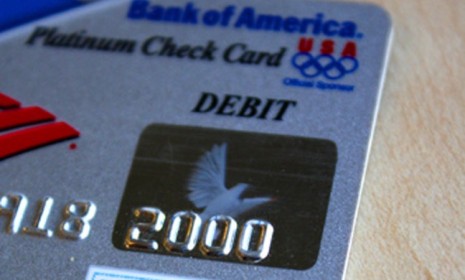The debit card fight: 5 things you need to know
America's new financial reform law will soon change the way large banks process debit card transactions. As a result, you may see an end to some perks

Get ready for some changes to your debit card account. As a result of last year's financial reform law, large banks will be slapped with a fee limit on debit card transactions. Beginning in July, banks such as Chase, Wells Fargo, and Bank of America will be prohibited from charging retailers more than 12 cents each time a customer swipes their debit card, down from a current average of 44 cents. Banks stand to lose billions of dollars from the rule change, and are lobbying furiously for it to be scrapped. But debit card holders may well be affected, too. Here, five ways the fight could affect you:
1. No more rewards
Debit card holders are used to rewards programs that give them airline miles, shopping deals, and sometimes even cash back. But some banks, including Chase, Wells Fargo, and PNC, are rolling back the customer perks to offset their own expected losses. Chase will bring its rewards program to a complete halt. Others are expected to follow suit.
The Week
Escape your echo chamber. Get the facts behind the news, plus analysis from multiple perspectives.

Sign up for The Week's Free Newsletters
From our morning news briefing to a weekly Good News Newsletter, get the best of The Week delivered directly to your inbox.
From our morning news briefing to a weekly Good News Newsletter, get the best of The Week delivered directly to your inbox.
2. A possible $50 cap on debit card transactions
Some banks are rumored to be considering a more drastic method of stemming losses from the fee limit: A cap on debit card transactions, perhaps as low as $50. Card issuers believe this will encourage consumers to pay with credit card, cash, or checks instead of using their debit card. This could be disastrous for the consumer, says Gino Bona at Fearless Revolution. Putting "obstacles" in front of debit card use would "drive consumers back to credit cards" and the "reckless spending" that comes with them.
3. Higher debit card fees
Some banks already slap monthly charges on debit card checking accounts, but these could rise exponentially after the fee limit is enacted, says Jane Bryant Quinn at Moneywatch. Analysts say consumers could see new, monthly service fees, a possible "increase in the number of times you have to use your card to qualify for a no-fee checking account," or even transaction fees of up to 25 cents on every purchase. Remember, "if your big bank does impose fees you don't have to put up with it." Institutions such as credit unions and community banks should stay "fee-free."
A free daily email with the biggest news stories of the day – and the best features from TheWeek.com
4. A $10 debit card minimum
For the first time, the financial reform law allows merchants to set a $10 minimum limit on debit or credit card purchases. That should theoretically reduce the number of transactions, encouraging customers to use cash or checks instead.
5. Lower prices in the stores
The fee limit is unquestionably good news for retailers, says Moneywatch's Quinn, for whom debit and credit card fees have traditionally been one of the highest costs. So will retailers "actually pass some of these savings on" to you, the customer? Some might. "In highly competitive businesses, such as grocery stores, consumers should benefit." But industries with "pricing power," like luxury clothes brands or high-end technology, probably won't.
Sources: Wall Street Journal, ABC, New York Times, PSFK, Fearless Revolution, Moneywatch, Boston Globe
-
 Why quitting your job is so difficult in Japan
Why quitting your job is so difficult in JapanUnder the Radar Reluctance to change job and rise of ‘proxy quitters’ is a reaction to Japan’s ‘rigid’ labour market – but there are signs of change
-
 Gavin Newsom and Dr. Oz feud over fraud allegations
Gavin Newsom and Dr. Oz feud over fraud allegationsIn the Spotlight Newsom called Oz’s behavior ‘baseless and racist’
-
 ‘Admin night’: the TikTok trend turning paperwork into a party
‘Admin night’: the TikTok trend turning paperwork into a partyThe Explainer Grab your friends and make a night of tackling the most boring tasks